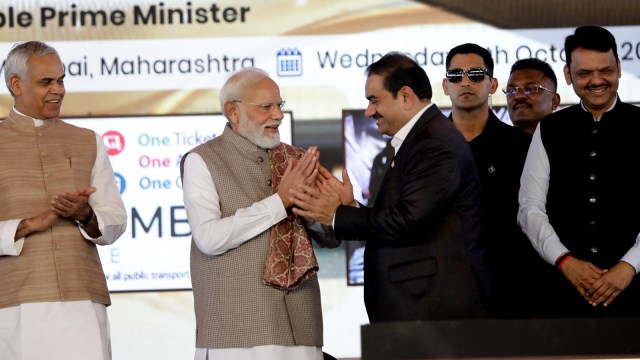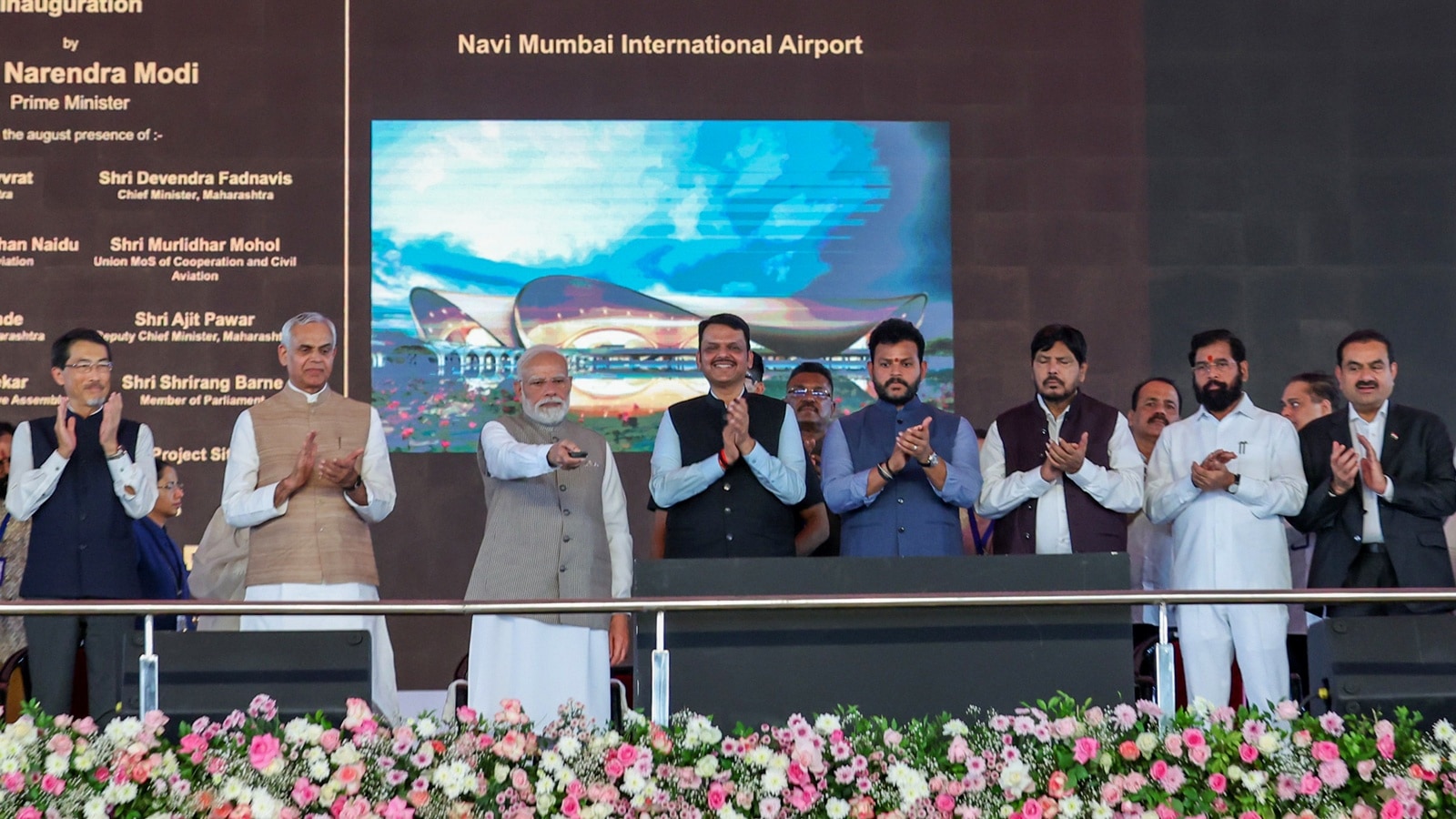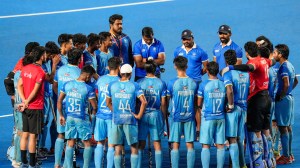PM opens Navi Mumbai airport, questions Congress on stopping military response to 26/11 terror attack in Mumbai
Describing the projects as those that reflect the “much cherished goal of Viksit Bharat”, the Prime Minister underscored their potential to play a significant role in growth, development and employment generation.
 PM Narendra Modi with (from left) Maharashtra Governor Acharya Devvrat, industrialist Gautam Adani & CM Devendra Fadnavis at the opening of Navi Mumbai airport. (Express photo by Narendra Vaskar)
PM Narendra Modi with (from left) Maharashtra Governor Acharya Devvrat, industrialist Gautam Adani & CM Devendra Fadnavis at the opening of Navi Mumbai airport. (Express photo by Narendra Vaskar)Asserting that “national policy” is the foundation of his Government’s politics, Prime Minister Narendra Modi Wednesday inaugurated two mega infrastructure projects in Mumbai — Phase 1 of Navi Mumbai International Airport and Phase 2B of the underground Metro Line-3.
Describing the projects as those that reflect the “much cherished goal of Viksit Bharat”, the Prime Minister underscored their potential to play a significant role in growth, development and employment generation. Modi also took a dig at the Opposition, saying the previous (MVA) government in Maharashtra had stalled such projects for political gain.
“Hum un sanskaron mein pale-badhe hain jahan rashtraniti hi rajniti ka adhar hai (We have been groomed in a culture where national policy forms the foundation of politics),” Modi said. “For us, every penny spent on infrastructure is the medium of providing facilities and enhancing capabilities of the citizens.”

“But on the other side, there is a political stream that has kept the benefits of politics above facilities for people. These are the people who create hurdles in development work, indulge in scams and corruption, and derail development projects. The country has suffered for decades,” the Prime Minister said.
“The Metro line, which has been launched today, is also a reminder of their deeds. I was part of this project’s foundation-laying ceremony and it had raised the hopes of lakhs of families in Mumbai that their troubles would now be reduced. But then, the government that came for some time (MVA), stopped the work. They got into power but they wasted thousands of crores of the country’s wealth,” he said.
Modi recalled Mumbai’s tryst with terrorism and targeted the then Congress-led UPA government for its “weak” response to the November 2008 attacks and pointed to this year’s Operation Sindoor as an example of his administration’s “befitting” reply.
 Prime Minister Narendra Modi inaugurates Navi Mumbai International Airport, at Navi Mumbai in Thane on Wednesday. (Source: DPR PMO/ANI Photo)
Prime Minister Narendra Modi inaugurates Navi Mumbai International Airport, at Navi Mumbai in Thane on Wednesday. (Source: DPR PMO/ANI Photo)
He attributed the recent GST reforms to the spurt in festival spending, while calling on consumers to opt for “swadeshi” products, and paid tribute to “Maharashtra’s Lokneta” D B Patil by recalling his “dedicated service” to society and farmers.
On his two-day visit to Mumbai, Modi also launched Mumbai One App, India’s first integrated common mobility platform, where commuters can access bus, metro, monorail and suburban rail services in the Mumbai Metropolitan Region (MMR) through a single ticket.
Earlier Wednesday, shortly after his arrival, the Prime Minister took a virtual tour of the Navi Mumbai International Airport (NMIA) spread across 1,600 acres and built at a cost of `19,650 crore with a current capacity of 20 million passengers per annum. Flights will become operational from December with Air India, Indigo Airlines and Akasa Air having already announced their plans to operate from NMIA.
Addressing a gathering at NMIA, Modi said the airport “will play a major role in establishing the region as Asia’s one of largest connectivity hub”. “This is not just an airport. Through this airport, farmers in Maharashtra will get connected to the global markets in the Middle East and Europe and it will also attract investments and new businesses,” he said.

Stating that the country had 74 airports in 2014, and 160 now, the Prime Minister said Indian aviation companies have placed orders of over 1,000 planes and that will lead to job creation not only for pilots, crew members and ground staff but also in maintenance, repairs and overhaul (MRO). “The goal is to establish India as a major MRO hub by the end of this decade,” he said.
“In 2014 when I became PM, I had said even those wearing hawai chappals should be able to fly in airplanes. Over the years, air travel has become affordable for people,” he said.
Speaking about the Metro rail network that connects South Mumbai with the suburbs, Modi said with the completion of this line, “a journey of two to two-and-a-half hours will be reduced to just 30 to 40 minutes”.
The Prime Minister also referred to the setbacks faced by the city, saying “the financial capital of the country and one of its most vibrant cities was targeted by terrorists in 2008 attacks. The then government in power sent a message of weakness and appeared to surrender before terrorism.”
Asserting that his Government has always given a befitting response to terrorism as was evident in Operation Sindoor, the Prime Minister referred to a “recent revelation by a senior Opposition party leader”. “After the Mumbai terror strike, the Army was ready to attack Pakistan and the entire nation supported such action. But the Government halted the military response due to pressure from a foreign country. The Opposition party should clarify who influenced this decision that undermined the sentiments of Mumbai and the nation,” he said.
Last month, former Union Home Minister in the UPA government P Chidambaram was quoted as saying in an interview to ABP News that the “whole world descended” on New Delhi to stop an act of “physical retribution” against Pakistan following the 2008 attack and then US Secretary of State Condoleezza Rice had asked him and then Prime Minister Manmohan Singh “not to react”. Subsequently, Chidambaram posted on X: “In no part of the interview…did I say that ‘US stopped us from retaliating after the 26/11 attack’.”
Referring to the recent GST reforms, Modi said, “We want to empower the poor, neo-middle and middle class.” He pointed to market statistics during the recent Navratri festival that showed record buying and selling of goods with consumers spending on scooters, bikes, TVs, etc.
For the coming Diwali festival, Modi called on people to adopt “swadeshi” to promote indigenous goods to help investment and employment. “Swadeshi is a mantra that should resonate in every home and market place. When every citizen buys swadeshi clothes… the nation’s wealth remains within the country. This will generate employment for Indian workers and jobs for the youth,” he said.
The airport launch event was also attended by Maharashtra Governor Acharya Devvrat; Chief Minister Devendra Fadnavis, Union Civil Aviation Minister Rammohan Naidu Kinjarapu; Union Ministers Ramdas Athawale and Murlidhar Mohol; and Japan’s Ambassador to India Keiichi Ono among others.







